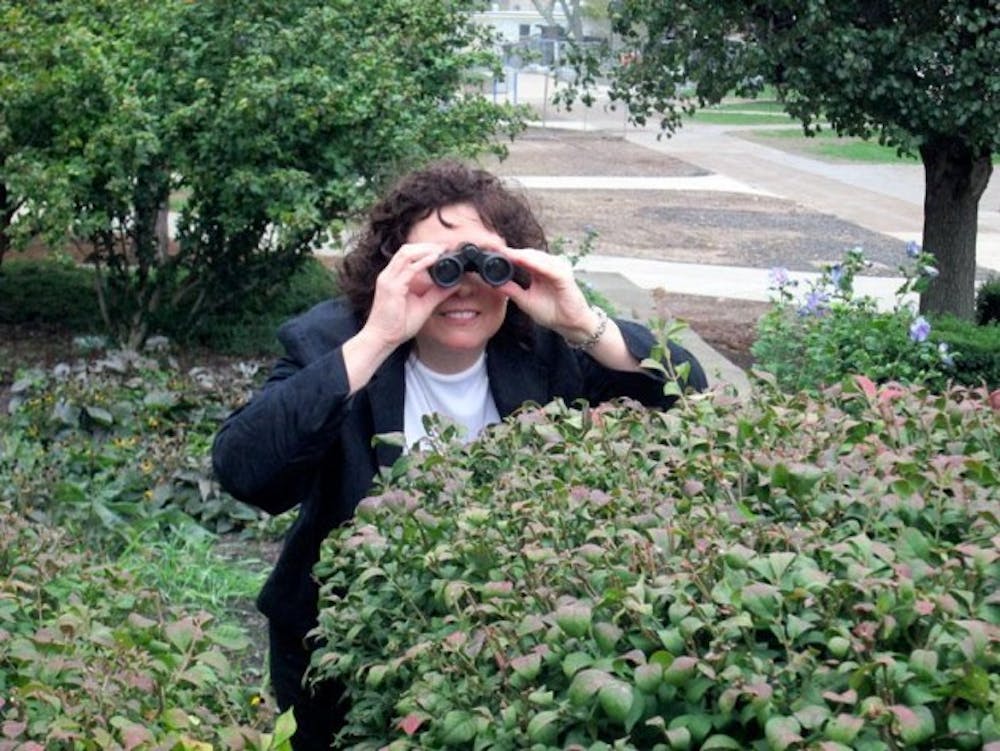Gunshots were firing all around her. She could hear the "ping" reverberating from the bullets bouncing off the rows of aircrafts in the hangar. She ran for cover in high heels and a skirt.
Janet Harslak made a beeline for the closest shelter available with her partner at her side. She spotted the man she was looking for: the man who was shooting at her.
Harszlak, now a communication professor, worked as a private investigator for a private company. For years, Harszlak played the role of various characters, using different aliases and personalities to make ends meet. She traded in her fake identities for a school ID and eventually decided what she ultimately wanted to do was teach.
Before she became a private investigator, Harszlak performed many odd jobs.
"I sang for so many weddings and played for so many events and store openings," Harszlak said. "I had reached a point where I was like, 'It's time to get a real job and decide what I want to do with my life.'"
That was when Harszlak answered an ad in the newspaper to be a midnight dispatcher. After being hired, she was instantly promoted from dispatcher to the midnight shift for the firm's security desk. She was in charge of overseeing the security guards in the Buffalo area.
The job only lasted two weeks. The company had more important things for her to handle.
"They had some investigation that [they] needed, and they needed someone to go undercover. So not only did it last two weeks, [but] I had to go undercover," Harszlak said. "Think about it, I had a couple years of college, was fit and no one would have ever suspected me of being a private eye."
Harszlak's first day as a private investigator was not easy.
When the manager of a company was poisoned, she was asked to uncover the culprit. The company wanted to discover who was trying to kill off its manager.
Harszlak went undercover as a regular employee on site with the company. Because of her knowledge, she did not want to take a chance of being poisoned while investigating.
"So I go to the lunch room with everybody. There sitting on this table is a beautiful plate of chocolate chip cookies, and everyone is looking at them," Harszlak said. "Nobody knew where they came from. As hungry as I was, I did not have a cookie."
This was not the only thing she would struggle with. She would soon find herself spending countless hours on rooftops and endless nights sitting in cars. With such inconsistent hours and an unpredictable life, dating was no small feat.
"[Dating's] kind of funny," Harszlak said. "It's not like Charlie's Angels. You don't just meet some guy on an investigation and you click and you two ride off into the sunset. It's never who you really are, so trust is always an issue."
Harszlak was never herself on the job. She was constantly switching identities based on her current situation.
Although Harszlak enjoyed her profession as a private investigator, it was too financially inconsistent. In the field, companies would only pay investigators after you get the information they're looking for, so sometimes she wouldn't get paid at all.
Harszlak decided to go back to school after her stint as a private investigator was over. She attended Buffalo State College and later went to UB for graduate school, where she became a professor.
Harszlak considers herself to be an analytical person. She has the ability to analyze her life experiences and turn them into lessons for the classroom.
"The person you see is a wonderful actress and I'm playing the role of a professor," Harszlak said. "The real me is just a genuine, sensitive, quiet individual. I'm not the social butterfly that you think I'd be. So when I teach about multiple selves and multiple roles, I'm the perfect example of that."
She also gives personal examples and uses them to help make the concept easier for the students to understand.
"If you are only comfortable with traditional professors and a typical classroom, I will make you extremely uncomfortable," Harszlak said. "Every class I teach is different and I do it purposely, because every student I teach is different."
She tells all her students is to do what makes them the happiest. At the end of the day it's happiness that makes up success, not money.
Email: features@ubspectrum.com





